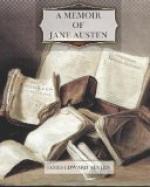’When I was a student at Trinity College, Cambridge, Mr. Whewell, then a Fellow and afterwards Master of the College, often spoke to me with admiration of Miss Austen’s novels. On one occasion I said that I had found “Persuasion” rather dull. He quite fired up in defence of it, insisting that it was the most beautiful of her works. This accomplished philosopher was deeply versed in works of fiction. I recollect his writing to me from Caernarvon, where he had the charge of some pupils, that he was weary of his stay, for he had read the circulating library twice through.
’During a visit I paid to Lord Lansdowne, at Bowood, in 1846, one of Miss Austen’s novels became the subject of conversation and of praise, especially from Lord Lansdowne, who observed that one of the circumstances of his life which he looked back upon with vexation was that Miss Austen should once have been living some weeks in his neighbourhood without his knowing it.
’I have heard Sydney Smith, more than once, dwell with eloquence on the merits of Miss Austen’s novels. He told me he should have enjoyed giving her the pleasure of reading her praises in the “Edinburgh Review.” “Fanny Price” was one of his prime favourites.’
I close this list of testimonies, this long ‘Catena Patrum,’ with the remarkable words of Sir Walter Scott, taken from his diary for March 14, 1826: {149} ’Read again, for the third time at least, Miss Austen’s finely written novel of “Pride and Prejudice.” That young lady had a talent for describing the involvements and feelings and characters of ordinary life, which is to me the most wonderful I ever met with. The big Bow-Wow strain I can do myself like any now going; but the exquisite touch which renders ordinary common-place things and characters interesting from the truth of the description and the sentiment is denied to me. What a pity such a gifted creature died so early!’ The well-worn condition of Scott’s own copy of these works attests that they were much read in his family. When I visited Abbotsford, a few years after Scott’s death, I was permitted, as an unusual favour, to take one of these volumes in my hands. One cannot suppress the wish that she had lived to know what such men thought of her powers, and how gladly they would have cultivated a personal acquaintance with her. I do not think that it would at all have impaired the modest simplicity of her character; or that we should have lost our own dear ‘Aunt Jane’ in the blaze of literary fame.
It may be amusing to contrast with these testimonies from the great, the opinions expressed by other readers of more ordinary intellect. The author herself has left a list of criticisms which it had been her amusement to collect, through means of her friends. This list contains much of warm-hearted sympathising praise, interspersed with some opinions which may be considered surprising.




